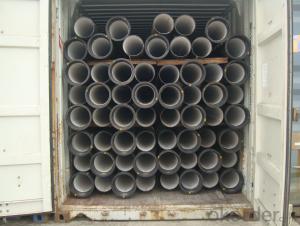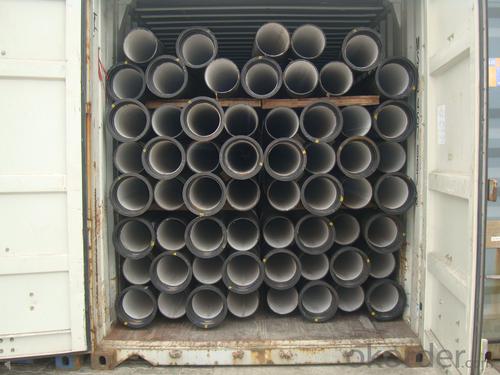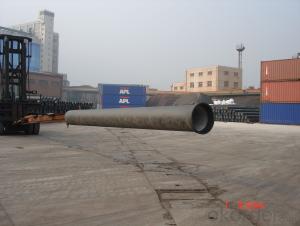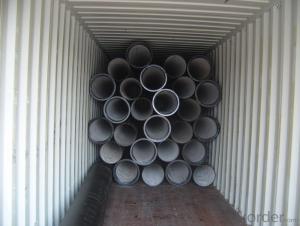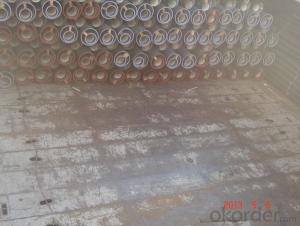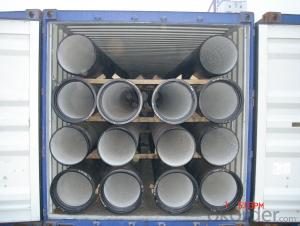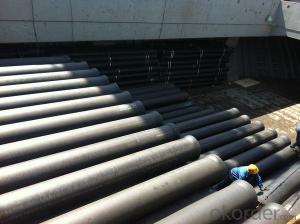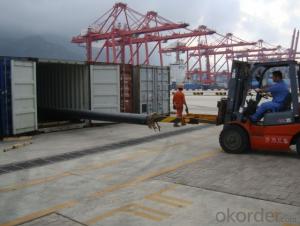DUCTILE IRON PIPE AND PIPE FITTINGS C CLASS DN80
- Loading Port:
- Tianjin
- Payment Terms:
- TT OR LC
- Min Order Qty:
- 23 pc
- Supply Capability:
- 3000 pc/month
OKorder Service Pledge
OKorder Financial Service
You Might Also Like
· Material : Ductile Cast Iron
· Size Range : DN 80mm to DN 2000mm
· Unit Effective Length : 6m or 5.7m
· Manufacture Standard: ISO 2531:1998/ EN 545:2006/EN 598:2007
· Annual capacity : 200,000 tons
· Coating Exterior: Zinc 130g/m2 according to ISO 8179-1 and bitumen coating 70 microns.
· Cement Interior: Portland Cement/ High Alumina Cement/ Sulphate Resisting Cement Lining according to ISO 4179
· Special requirements on external coating and internal lining can be applied
· We also provide accessories such as SBR/EPDM rubber gaskets, lubricant paste, pipe caps, PE sleeves, etc.
Additional Parts:
Each pipe is strictly inspected according to related standard to ensure permanently high performance.
Easy Installation at site and service free for life
Long Service Lifespan
Quotation will arrive you within 24hours once we get your inquiry.
We guarantee offering you a competitive price.
A copy of original inspection reports of pipes will be offered after shipment.
Photos of loading process will be sent to the customer after shipment effect.
We will follow-up the delivery progress after shipment effect and update to the customer on weekly basis.
- Q: It's not easy to drill ductile iron with cobalt high speed steel bit. Please help to point it out
- Determine the authentic M35 cobalt bit, which is about 65HRC in hardness. General workpiece hardness of about 45HRC or less of the problem.
- Q: How much water seepage is allowed in the water pressure test for water hose DN300?
- Test method: metal composite pipe and water pipe system 10min observed in the test pressure, the pressure drop should be no more than 0.02MPa, and then reduced to working pressure check should be no leakage of plastic pipe; water supply system should be in the test pressure regulator 1H, pressure drop shall not exceed 0.05MPa, then stabilized at 1.15 times the working pressure of the state under 2h, the pressure drop shall not exceed 0.03MPa, and check each connection must not leak.
- Q: Are ductile iron pipes suitable for use in desalination plants?
- Yes, ductile iron pipes are suitable for use in desalination plants. Ductile iron is known for its high strength and durability, making it capable of withstanding the harsh conditions and corrosive nature of desalination processes. Additionally, ductile iron pipes have excellent resistance to internal and external corrosion, making them a reliable choice for transporting the high-pressure brine and freshwater in desalination plants.
- Q: Can ductile iron pipes be used for bridge drainage systems?
- Indeed, bridge drainage systems can make use of ductile iron pipes. Ductile iron, a resilient material, finds widespread use in numerous applications, such as water and sewage systems, owing to its strength and durability. With exceptional resistance to corrosion, it is capable of enduring substantial loads and pressure, rendering it an ideal choice for bridge drainage systems. Moreover, the smooth inner surface of ductile iron pipes facilitates efficient water flow, preventing the occurrence of clogs and blockages. Therefore, given their robustness, longevity, and capacity to handle the necessary water flow, ductile iron pipes prove to be a fitting option for bridge drainage systems.
- Q: Can ductile iron pipes be used in areas with high soil liquefaction potential?
- No, ductile iron pipes are not recommended for areas with high soil liquefaction potential.
- Q: What is the manufacturing process of ductile iron pipes? Thank you
- Pig iron function: pig iron is strong, wear-resisting, good forging, but pig iron is crisp, cannot forge. Most frequently used: ductile iron covers, ductile iron pipes, ductile iron pipe fittings, ductile iron pipes are widely used in our life.
- Q: Are ductile iron pipes available for cutting and are there any relevant specifications?
- You can cut, there should be no specification requirements, as long as you can use, in line with the needs of the project can
- Q: What is the average weight of ductile iron pipe?
- The average weight of ductile iron pipe can vary depending on its size and thickness. Generally, ductile iron pipe ranges in weight from approximately 3.5 pounds per foot for smaller diameters to over 20 pounds per foot for larger diameters. It is important to note that these weights are approximate averages and can vary slightly based on specific manufacturers and pipe specifications.
- Q: The plug connection DN800 ductile iron pipe has been installed. "Shall I think so?"
- The main components of ductile iron pipes are carbon, silicon, manganese, sulfur, phosphorus and magnesium. Perform standard [span]GB/T13295-2003 ISO2531/2003
- Q: Can ductile iron pipes be used in areas with high levels of heavy metal contamination?
- Ductile iron pipes can indeed be used in areas with high levels of heavy metal contamination. Ductile iron is a strong and durable material that is resistant to corrosion, making it suitable for various environmental conditions, including areas with heavy metal contamination. The high levels of heavy metals in the surrounding soil or water do not affect the structural integrity or performance of ductile iron pipes. These pipes have a protective lining, usually made of cement mortar or polyethylene, which acts as a barrier between the pipe and the surrounding environment. This lining prevents the heavy metals from leaching into the water flowing through the pipes. Furthermore, ductile iron pipes have been proven to be highly resistant to chemical corrosion, including the corrosion caused by heavy metals. They have been extensively used in industrial applications where heavy metal contamination is common, such as wastewater treatment plants, industrial facilities, and mining sites. However, it is important to note that while ductile iron pipes can withstand high levels of heavy metal contamination, regular monitoring and maintenance are still necessary. This ensures that the protective lining remains intact and any potential issues are addressed promptly. In summary, ductile iron pipes are a suitable choice for areas with high levels of heavy metal contamination. Their strength, durability, and resistance to corrosion make them reliable for transporting water and other fluids, even in challenging environments.
Send your message to us
DUCTILE IRON PIPE AND PIPE FITTINGS C CLASS DN80
- Loading Port:
- Tianjin
- Payment Terms:
- TT OR LC
- Min Order Qty:
- 23 pc
- Supply Capability:
- 3000 pc/month
OKorder Service Pledge
OKorder Financial Service
Similar products
Hot products
Hot Searches
Related keywords
